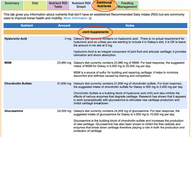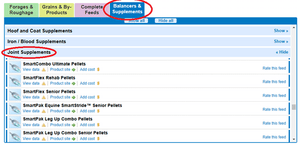Understanding and Analysing Nutrients in Joint Supplements with FeedXL
Analysing Joint Supplements
When it comes to your horse’s joint health, you may turn to supplements to provide essential nutrients that support mobility, flexibility, and overall joint function. But how do you know if your horse’s joint supplement is doing all that it can? FeedXL allows you to analyse the nutrient content of your horse’s diet, including joint supplements, to ensure they meet your horse’s specific needs.
When looking at joint supplements, consider the following common ingredients:
Glucosamine is one of the most popular ingredients when it comes to joint health. Not only does it provide the building blocks for synthesis of glycosaminoglycans (including chondroitin sulfate and HA), which are key to healthy cartilage, it’s also thought to play a role in inhibiting the breakdown of cartilage. It can appear as both glucosamine hydrochloride (HCl) or glucosamine sulfate (SO4) on supplement labels, but there is no conclusive evidence on which form is more bioavailable.
Chondroitin sulfate may support a normal cartilage inflammatory response by playing a role in inhibiting the effects of various enzymes that degrade cartilage. Known as a “building block” of hyaluronic acid and proteoglycan, you’ll often see it in combination with glucosamine in joint supplements.
Hyaluronic Acid (HA) is an integral component of joint fluid and articular cartilage. HA provides lubrication for the joint and helps maintain the correct viscosity of the joint fluid.
Methylsulfonymethane (MSM) plays an important role in forming protein, immunoglobins, certain enzymes, and connective tissues such as tendons and ligaments. It’s often found in joint supplements because of its properties as an antioxidant as well as a way to support a normal inflammatory response.
Trace minerals, including copper and manganese, are incorporated into the building blocks responsible for healthy joint structure and function. Healthy copper levels help support normal connective tissues, cartilage, bones, and hooves. Manganese helps form chondroitin sulfate, which in turn supports healthy bones and joints.
Vitamin C, an antioxidant, plays an important role in collagen synthesis and is an important part of the production of healthy tendons, ligaments, and bones. While horses produce their own Vitamin C, factors such as age, stress, and underlying health conditions may cause a horse to need more than they can produce on their own. Click here to read more on Vitamin C.
Omega 3 fatty acids help mediate inflammation throughout the body. Horses need a balanced ratio of omega 3 to omega 6 fatty acids and due to modern horse keeping conditions such as reduced pasture intake and feeding fortified grains, many horses may be unbalanced in this area. To learn more about the role of omegas in your horse’s diet, be sure to read our blog: Omega 3s for Horses
FeedXL makes understanding joint supplements easy
If you’re a FeedXL member and using a joint supplement, get the most out of your membership by using our Premium plan. Add any joint supplement to your horse’s diet and get a breakdown of the amount of each joint nutrient provided by that supplement and see if that falls within the suggested supplementation range for best results.
Since there are no established recommended daily intakes (RDIs) for these nutrients, FeedXL provides you with a range for suggested intake based on various studies.
You can also use FeedXL to browse the list of joint supplements available on the market, add them to your diet, and check to see what nutrients they supply and at what levels.
Adding costs can also be a great way to find a joint supplement that not only provides your horse with what they need but also fits your budget.
The research
Research on joint supplements, their ingredients, and their efficacy is an ongoing area of study. It’s important to remember that while certain key ingredients may play a role in healthy joint function, if it sounds too good to be true, it probably is. When it comes to supplements or companies making claims to “treat,” “cure,” or “heal” things, be sure to maintain a healthy amount of scientific skepticism. For more on the research on joint supplements, click here.





